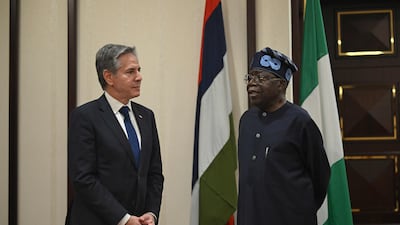US Secretary of State Antony Blinken pledged $45 million in new funding for security in West Africa while meeting the President of Ivory Coast in Abidjan on Tuesday.
The region has struggled with the rise of several terrorist groups in recent years including Jama’at Nusrat Al Islam wal Muslimin (JNIM), a group affiliated with Al Qaeda.
While the security threat remains most pressing in the Sahel, an area that covers thousands of square kilometres across northern Africa from the Atlantic Ocean to the Red Sea, it has begun to migrate south, affecting countries such as Ivory Coast, Benin and Togo.
Ivory Coast, site of one of West Africa’s most robust economies and governments, has become a significant US partner in combating terrorism in the region.
“Cote d'Ivoire [Ivory Coast] is an essential partner for us and for other countries in the region that are trying to move forward,” Mr Blinken said at the opulent Presidential Palace.
“We appreciate particularly the leadership shown by Cote d'Ivoire in countering extremism and violence.”
Since 2022, Washington has contributed nearly $300 million in “stability-focused assistance”, the US State Department said.
“The security of our region is difficult and we appreciate the US for all their support in countering terrorism,” Ivory Coast President Alassane Ouattara said.
Mr Ouattara has been outspoken in his opposition to last summer’s coup in Niger, when the military junta overthrew and jailed democratically elected President Mohamed Bazoum.
At one point Ivory Coast, along with its partners in the Economic Community of West African States, threatened military intervention.
“We noted and applauded the very important leadership of the President in other regional issues, particularly the very hard but important work of trying to return Niger to constitutional order,” Mr Blinken said.
Niger had been a crucial partner in the region’s fight against terrorism. The US still has about 1,000 soldiers in Niger and had invested heavily in counter terrorism training in the country.
Following the overthrow, which it took the State Department three months to officially label as a coup, Washington suspended their training programmes, cut aid and repositioned troops.
Mr Blinken travelled to Nigeria on Tuesday evening, where he met President Bola Ahmed Tinubu and Foreign Minister Yusuf Tuggar.
Nigeria, the continent's largest country and economy is also grappling with the threat of terrorism and the recent coup in neighbouring Niger.
“We are intensely focused on challenges to security in the region, in the Sahel, intensely focused because of the impacts it's having on our friends and partners,” Mr Blinken said in Abuja.
The US Secretary of State is on a four-nation tour of West Africa, where he is trying to assert US leadership and promote American investment in the continent.
“We're here for a very simple reason – because America and Africa's futures, their peoples, their prosperity are linked and joined as never before,” he said.


